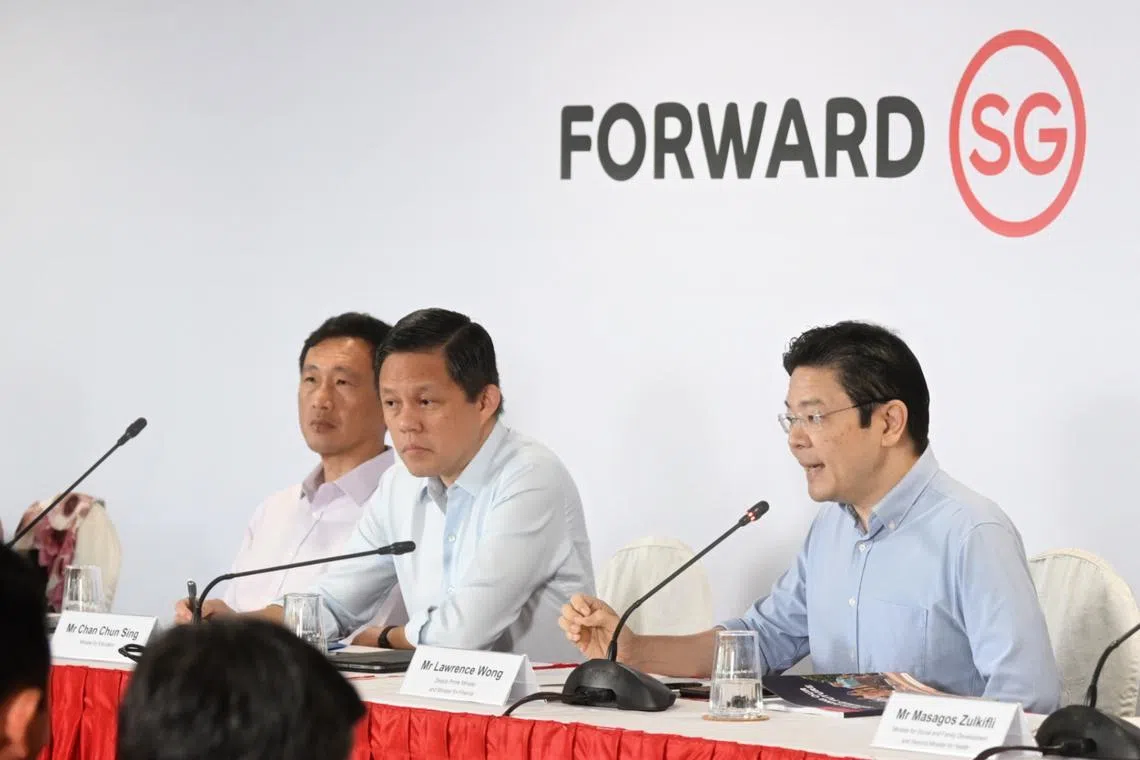20 years as PM
New leaders will be probed, must be ready to respond: PM Lee
Sign up now: Get ST's newsletters delivered to your inbox

Deputy Prime Minister Lawrence Wong at a press conference in 2023 with (from left) Health Minister Ong Ye Kung and Education Minister Chan Chun Sing.
PHOTO: ST FILE
SINGAPORE - As incoming prime minister Lawrence Wong
People will want to get the measure of the new leaders and their policies, suss out the new prime minister’s domestic standing and support, as well as his ability to engage and hold his own, he said at an interview when asked if Singapore might be tested amid the upcoming leadership transition.
“I think that the new team will be probed, certainly. Tested, well, maybe gently, maybe issues will come, and people might push a little bit harder, or maybe not,” he said.
“But we must expect that some probing will come, and we must be ready to respond. Not in a harsh way, but quietly to stand our ground and let people know that we may have had a changing of the guard, but the new guards are prepared, and the old guards are still giving hopefully useful views to the new team on how to do it.”
To this end, Mr Wong, who is Deputy Prime Minister,
Most recently, in April, DPM Wong visited Germany and France. a trip to the United States
Speaking on foreign policy during the wide-ranging interview, PM Lee said Singapore’s diplomacy has helped the Republic to “carve a spot in the world”.
“People recognise us. There is a certain respect for us and that is good.”
But the external environment has also become more troubled, with geopolitical tensions rising and confidence in free trade shaken.
Amid this, Singapore has become more connected to the world. From TikTok videos to internet memes, WhatsApp messages and even travel, Singaporeans are now more exposed to influence from the outside, said PM Lee.
The result is that foreign policy and domestic policy have become increasingly intertwined, and Singapore has had to adapt, he added.
PM Lee recounted how he made a private and unofficial trip to Taiwan in 2004 before taking over, when he was still deputy prime minister.
“It caused a rumpus, and I had to state my position.
“So, my first National Day Rally, I had to spend time talking about not just foreign policy but that trip to Taiwan and why I went and why it was important to us, and why Singapore’s national interest required me to do that, and that it was necessary for me to do so, even though it caused a kerfuffle at that time,” he said.
During the last 20 years,
While Singapore’s foreign policy has always been based on the country’s long-term national interests, there can be different and competing national interests to balance.
“A specific issue comes up – there is a test – somebody probes your maritime boundary a little bit and on the other hand, he is offering to do business with you and trade green energy, for example. Do you get angry? Do you decide to overlook this and then I do business and I lump it? There is no formula answer,” said PM Lee.
“You have to look at each one, each situation, and then you have to judge. And in a big case, if you have to make a big decision and take a stand. Then the people will have a view and the Government will have to take that into account, and the Government hopefully will have its own considered view and will talk to the population, and we will discuss this.”
What has not changed over the years is the fact that Singapore is still a little red dot – “a bit redder but still little”, said PM Lee.
Singapore still depends on an international rule of law and trade, and needs to protect its interests in an environment “where everybody is jostling with one another, and we are not the biggest person in the discussion”, he added.
“We have to hold our own, which takes quite a lot of doing and keeps MFA (Ministry of Foreign Affairs) very busy.”
To remain relevant, Singapore must continue to make friends and strike up relationships with other countries where there is common cause to be found, he added.
He cited how Minister for Sustainability and the Environment Grace Fu has played an active role at the UN Climate Change Conferences.
At one meeting, she was put in charge of negotiating carbon markets – “one of the most vexed subjects on the agenda”. She went in as an honest broker and helped to pull the different perspectives together, eventually reaching a landing, PM Lee said.
“We have to master the issues, understand what they are about. If we can be helpful in putting up ideas which can bridge different positions and move a little bit closer towards an outcome, a landing place, we are very happy to do that,” he said.
“We do have a bit of a reputation for that, and it is a good reputation.”
This preparedness has sometimes put the other party on the defensive, as they may feel they have to be careful, noted PM Lee.
“But I think it is better to be prepared than for people to say, ‘Let us go and see them, they have not done their homework, and we will have a good time’,” he added.
Asked about relations with Singapore’s closest neighbours, PM Lee said: “We have been lucky. Relations with both have been generally good.”
“I think both will always be complicated relationships. Nearest neighbours, permanently nearest neighbours; you have to work together, and yet there are always so many places where you can easily have different perspectives or rub up against each other. And I think we both know that, and both try our best not to collide, because we can do many things together.”
With Malaysia, progress has been made on issues such as Pedra Branca and the Malayan Railway land deal, he said.
He added that he had spoken to Malaysian Prime Minister Anwar Ibrahim on other issues, which can be cooperative but also sensitive, such as airspace, the delimitation of maritime boundaries, and water.
“These are things which need to be discussed. We have not settled them. So, there is work to be done by my successor,” said PM Lee.
With Indonesia, Singapore had inked three landmark pacts on airspace management, defence cooperation and extradition. The agreements came into force in March 2024
PM Lee said this puts both sides “on a good (long-term) basis that takes our two countries the next steps forward (to) cooperate together”.
On the US and China, PM Lee said the underlying tensions and contradictions between their national positions and interests may result in continued tensions for the next 10 years, maybe even 20 years or more.
Fortunately, Singapore has good relations with both, he noted.
With China, Singapore has various areas of cooperation, ranging from government-to-government projects in Suzhou, Tianjin and Chongqing, to an upgraded free trade agreement.
“We have had good relations with China for quite a long time now, despite periodic kerfuffles,” said PM Lee.
“So, I think overall, our relationships with them are very warm, and I think they know that we would like to do more with them, and we are not against them.”
At the same time, China knows that although Singapore is a majority ethnic Chinese country, “we are different from them”, added PM Lee, noting that it was important to maintain the proper relationship based on national interests and not ethnic identity.
With the US, Singapore has investment links, and both sides cooperate on defence and security. There are more than 1,000 Singapore Armed Forces personnel in the US at any time – one of the biggest foreign military contingents there.
Fundamentally, Singapore believes that America has an important and constructive role to play in the security and prosperity of the region, said PM Lee.
Meanwhile, Asean has remained a cornerstone of Singapore’s foreign policy, he said, noting that the grouping helps to contribute to and also benefits from a stable and secure region.
But the peace and stability of the past 40 years cannot be taken for granted, especially amid the big power tensions and rivalries that could have an impact on this part of the world, he added.
“Are we absolutely sure that for the next 20 years, there would be no war? I think the answer is, we cannot be absolutely sure. It could happen, probably not, but things can go wrong,” said PM Lee.
He added that regional resilience is as important as national resilience, and Singapore will have to “keep on building this up, contributing to it and playing our part, even though we are a very small member of Asean”.
“For the long term, what is important for the region is war and peace, and what can Asean do to contribute to peace in the region.”



